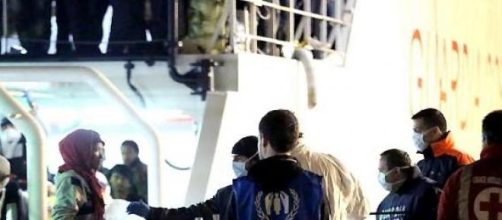The world has been horrified by the tragedy involving refugees from Northern Africa off the coast of Libya who drowned trying to make it to Italy in what is said to be the worst such drowning incident in Mediterranean Sea history. But some people may not know that not only are refugees fleeing Yemen to get out of the war zone there, but at the same time refugees are also arriving to Yemen from Ethiopia and Somalia, with 251 arriving in Mayfa'a Yemen on Sunday.
A spokesman for the UNHCR said "many of the 250,000 mainly Somali refugees in Yemen are also affected by the conflict and we continue to see an increase in people moving from urban areas around Aden to the Kharaz refugee camp, hosting 18,000 people." As refugees from the Yemen conflict flee across the Gulf of Aden in boats to Somalia and Djibouti, Ethiopian and Somalian refugees flee to Yemen as either a transit point, mostly for Ethiopians, or for asylum for Somalis.
Because of the escalating conflict in Yemen, the country has roughly the same number of internally displaced persons as it has refugees and asylum seekers from other countries. According to the UNHCR, Yemen is a transit country for many Ethiopians with about half officially registered as asylum-seekers. By far there are more Somalis fleeing a civil war that began in 1992 with nearly a quarter million in the country. Inside the country, due to the instability and conflict, there are an estimated 365,000 internally displaced persons. Air raids by Saudi Arabia on Houthi rebels were supposed to be ended on Tuesday, according to Saudi Arabia, but the New York Times reported that airstrikes continued on Wednesday, this latest strike in the city of Taiz in Southwestern Yemen.
The International Committee for the Red Cross (ICRC) has warned of a dire situation in Yemen where people are desperately waiting for surgical support and other humanitarian needs stemming from the recent fighting. ICRC head of operations in the Near East and Middle East, Robert Mardini, recently back from the city of Sana'a, said "today nowhere is safe in Yemen." He explained there was no electricity, a lack of fresh water and that he was "shocked" at what he had seen during his visit. The ICRC has received no confirmation that the airstrikes that have continued from a Saudi led coalition of Arab states will be stopped, but he expressed a "glimmer of hope."
Last weeks, hundreds of people died trying to escape Libya to Italy across the Mediterranean by boat by human smugglers. The Italian coast guard vessel Bruno Gregoracci brought in survivors and bodies on Monday to Malta. The Guardian reported that at least 700 people perished at sea, with numbers as high as 950 people drowned, some of them locked in the hold of the ship by the human smugglers. According to The Guardian, prosecutors told them they had detained 27 year-old Tunisian Mohammed Ali Malek, thought to be the captain of the capsized ship, and Mahmud Bikhit, 25, from Syria.
© ALL RIGHTS RESERVED

